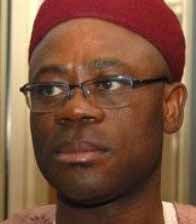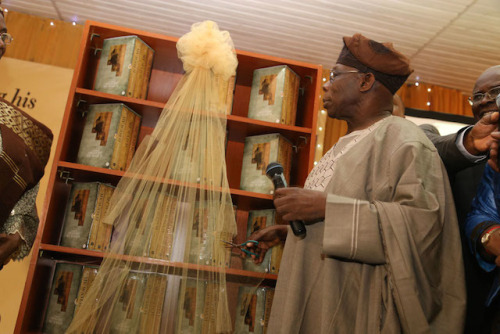Why this unrestrained advocacy for someone who doesn’t even know how I look physically or whom I have never met myself? There are two reasons. The first one is that, by time-fixed engagement with other things, I am not looking for anything political from anybody other than the political health of Nigeria. So, I am totally unconstrained as nobody can say I am pushing for a personal advantage. The second is that, at a time like this, intellectuals of power must embark on this sort of advocacy because, unlike the practitioners of power, they can afford to step back and ‘shout plenty’ if what they see warrants such. So, this is not advocacy but ‘shouting plenty’, believing that shouting plenty is a more radical thing than consensual advocacy. Abi?
The key argument here is that there is a principle of selection of leaders which Nigeria must begin to operationalise by now. I am referring to the principle in most societies whereby power goes to those who have made sacrifices for the country already, not those who might or who have not made any in spite of opportunities given them or encountered. This principle could produce someone we might not quite like but it is a more reliable criterion than any other. More so in the context of the impending electoral contest in 2015 when the country is confronted by elements with inclination to experimenting with anarchy. It is in this broad context that Rotimi Amaechi should have been a great choice as Buhari’s Vice-Presidential candidate. Having lost that, he should be thought of in the impending re-arrangement of power in Nigeria, whether APC wins or not. I am not ignorant that he has been appointed Director of Buhari’s Campaigns which will test anybody’s capabilities to breaking point.
To the extent that the APC could form the next government and preside over the destiny of nearly two hundred million citizens under one government, the choices it makes are no longer its exclusive matters. In other words, it is not an intrusion for non-party members to pose an issue like this, citizenship being now a more critical qualification required in that regard. There must be concrete reasons why the mandarins and combatants in APC did not pick Governor Amaechi of Rivers State as General Buhari’s Vice-Presidential candidate. There might be strategic electoral calculations which may not be obvious to those in the outer perimeters of the party. The imperative of taking note of the Tinubu/Yoruba real and symbolic sacrifices in constituting opposition in the last few years may explain the de-selection of Amaechi but the role of discourse may also not be dismissed as most people are rarely ever correctly understood or much of what we know about most people is power enacted by words. In other words, discourse might also have played a role in the sense that one big man up there could have said, oh that guy is like this or like that, don’t pick him. Unfortunately and most of the times, this works more than the reality, if there is anything called reality at all. (Something helps me from moving completely from Marxism to post-structuralism!). Finally, the difficulty of managing the multiplicity of interests encased in what appears an establishment consensus in favour of APC might equally explain Amaechi losing it. There is no party that would not have difficulty balancing such convergence.
APC has tried in coming up with an absolutely well educated Vice-Presidential candidate in Yemi Osibajo. A Vice-Presidential candidate with intellectual and some technocratic pedigree is certainly a perfect balance for a president with military-statist orientation. It is not arrogant to say that the complexity of the world today is going beyond the abilities of the politicians the world over and a presidential candidate in Africa who arms himself with a product of the London School of Economics and a technocrat suggests that he is ready for business. In other words, Buhari has started so well or covered so much distance by a single move. It is hoped that the Osibajos would displace the other deluded characters prating around Buhari, hiding under him to pose as democrats. Given the big battle ahead in which anything can be manipulated, from region to religion, the choice and the quality of the Vice-Presidential candidate can be as decisive as that of the choice and quality of the presidential flag bearer.
Advertisement
But this admirable ‘reality’ would not stop me from arguing that time has come to create room for people like Rotimi Amaechi at the highest level of power in Nigeria. The best would have been as Buhari’s VP candidate. Now that such is not the case, it is time to think imaginatively about a role for someone like Amaechi.
Before I itemise the specific reasons for my advocacy, let me give the background to my analysis. And it is that this is not the first time I have advocated Amaechi. I did so before when, on the basis of a newspaper article by someone during the 2010 shouting march regarding Jonathan’s candidature in the 2011 elections, I concluded that Nigeria would enter its usual leadership selection crisis in 2015. This was because the writer of that piece was angry that by ignoring his advice against being sworn-in before assuming presidential powers upon the death of Umaru Yar’Adua, Jonathan had blocked his chance of going beyond 2015. My reading was that once Jonathan could not continue beyond 2015, leadership would have to come to the North. How would a terribly divided North handle that without deep divisions? One way of doing that which came to my mind was if ethno-religious activism in the North could be supplanted with ideological politics, that would be a way out. Since the NEPU-PRP remains the clearest expression of such an ideological orientation, could promoting a symbol of that tendency solve the problem?
It was in searching for a symbol that Sule Lamido came up along with two others, one of them a woman. But Lamido was rated higher because he was in charge of a government, a notable member of the party in power at the centre and the only surviving element of that order. Above all, Lamido satisfied the criterion that the post Jonathan leader in Nigeria must be a ‘rascal’. But you cannot have a presidential material without a material who could be his Second in Command if the construction as then were to come to work. This was how Amaechi was suggested as a chimerical pair of the best political rascals thought plausible for Nigeria. One hopes everyone understands the sense in which I am using the word rascal here.
Advertisement
However, immediately the centrespread newspaper piece in which I floated the fleeting thought was published in May 2012, an avalanche of sundry characters, mostly crafty intruders, gold diggers and high calibre lumpens descended on the scene. The gold diggers and intruders could never imagine such an idea coming from any other place but from on-high. In fact, one newspaper kept hallucinating on its front page how Obasanjo was positioning Lamido for power, showing how little they knew about how the Obasanjo-Lamido relationship worked. Combined with infatuation for big name politics and lack of a sense of ‘stoop to conquer’ by key actors, the idea triumphed rapidly into an anarchy of a sort as the way it was being choreographed got an intensely insecure Jonathan who had grown too much in love with the Villa to begin to see real challengers in Lamido and Amaechi. So, instead of something aimed at Lamido being a possible name Jonathan could be considering in the unlikely event that he could circumvent the constitutional provision on number of times allowed to be sworn-in, it became a case of Lamido and Amaechi conspiring with Obasanjo to oust Jonathan. The outcome was a foregone conclusion as both governors came under rapid presidential fire. As I watched the whole thing play out from my school at UI, and later as an outcast of power, I didn’t know whether to laugh or cry.
Why did it bother me? It bothered me because, there is no time I can forget that day and moment in September 2007 when Lamido proclaimed that the census and the subsequent payment of a monthly stipend to physically challenged persons under the first ever social security regime in Nigeria meant that nobody would go to bed hungry in the state. It wasn’t going to be true that a paltry monthly payment of 8000 naira would end the structural situation where some people go to bed hungry in a place like Jigawa but it was a statement that would echo in the headquarters of the IMF and the World Bank if anything close to that were to have been said by a Nigerian president. It was, indeed, an earth shaking statement, an interpretive version of sentences straight from the 1978 General Statement of the PRP. Anyone who could make such a statement at any level of power anywhere in Africa was, in my view, a presidential material, especially as the proclamation was followed by similar other genuine things that Lamido started with. It was, therefore, a tragedy watching helplessly as the dynamics worked out in such a way that the same Lamido was to encounter Abuja power subsequently in a way that he might still be staggering. The point here is that this claim of an Amaechi’s singularity and on which this particular advocacy is based is a continuation of what started many years back, not a sudden, opportunistic Nigerian way of doing things.
The basis upon which an Amaechi singularity is argued are as follows. As I have written repeatedly elsewhere, the first is his risky insistence in the heat of insurgency in the Niger Delta that there must be a distinction between militants and criminals. My interpretation of that statement is that it was a vote for Nigeria by someone who was so comfortable in the system to be unconcerned. It remains a strategic statement, more so that it was made not by someone based far away from the Niger Delta but living right there amidst the militants and ‘militants’. I came to appreciate the distinction between a statement by any Niger Delta elite when Ledum Mittee came to the Institute of African Studies at the University of Ibadan in late 2011. On why the local elite have not seemed to help matters, he said we should not forget that multinational oil companies and Abuja (federal power) each have their own among the elite. So, there is nothing like a constitutive elite that we can talk about.
The second point is that Amaechi was fundamentally wronged before and if he were not a militant of some sort and, therefore, strong, nobody would be hearing his name today. It is gratifying that Obasanjo has taken the pain to reconcile with him in his life time. It is assumed that all those who conquered such adversity can be trusted with the fate of other human beings because they encountered injustice and would not be party to it, even against those that might be their enemies.
Advertisement
The third reason is that Amaechi had a conceptual approach to governance. Let me confess here that I am talking of about 2012. I have no idea what he did after that but during the time covered in a study I handled for a Nigerian run INGO, I found him absolutely great. I always take his approach to management of primary schools as the sampler. Not only did he bring in an expert from Cambridge University, he followed the critique and blueprint handed him by the assessors. I was still in Jigawa by then where we considered ourselves to be doing a NEPU kind of revolution but there were quite a number of things in the Amaechi approach that were not covered in the Jigawa frameworks.
The fourth factor has already been covered: Amaechi and Lamido coming under federal fire power once an imaginary was floated. It got to a point I had to write a piece wondering why the seven PDP governors who walked out from a PDP show in Abuja would not pay Amaechi a solidarity visit. It might have been a coincidence but it is something I can claim credit since my piece preceded the eventual solidarity visit of the seven governors who paid such a solidarity visit two days after my piece. Abuja was so angry they ‘detained’ the governors in Port Harcourt Airport for hours before allowing them to enter PortHarCourt town.
Again, there is a sense in which his opposition to Jonathan has given a federal character to opposition politics in Nigeria. Very few of us can carry this out when the president is from our place because it is not just the conviction, it is risky. And before our own very eyes, he has gone through hell under a GEJ whom we are told cannot hurt a fly.
Add to the four key points above his being educated, young, militant and advocate of popular causes, (hence the nickname Rotimi, after Rotimi Williams, the quintessential lawyer in advocacy in the courts in those days). The point is that when you give Nigeria to people like Rotimi Amaechi, come what may, you don’t worry about the government itself being the conscious and unconscious problem for the state. The truth is that there are very few in power today as ministers, governors, senators, etc about whom we can say this. After all, former Vice-President Atiku Abubakar claimed not long ago that he warned governors who were raising and relying on private armies. Up till this moment, no governor during the time Atiku was Vice-President has come up to challenge him, meaning that he is telling the truth. His statement is important because it came from those within the bracket of the ‘hierarchy of credibility’ in national security issues throughout 1999 – 2003 when he was the Vice-President. Experience of insurgencies, violent politics and mindless corruption of the last one decade or so should instruct Nigeria to take leadership recruitment more seriously and systematically. Given the role of all past living heads of state in bringing about the virtual collapse of the country, they should take this as their last duty. Then they would have compensated Nigeria, if anybody can still compensate what people in the North East and all of us, by implication, are going through. I am referring to the Gowons, Obasanjos, the Shagaris, the Buharis, the IBBs, the Abdulsalamis, the T.Ys, etc leading their counterparts in industry, academia, judiciary, media, etc to accomplish this before their generation evaporates. Otherwise, we might have no option than do intellectual violence to their memories.
Advertisement
Views expressed by contributors are strictly personal and not of TheCable.
1 comments




If more than anything, the likes of Amaechis can be trusted with Nigeria’s destiny.